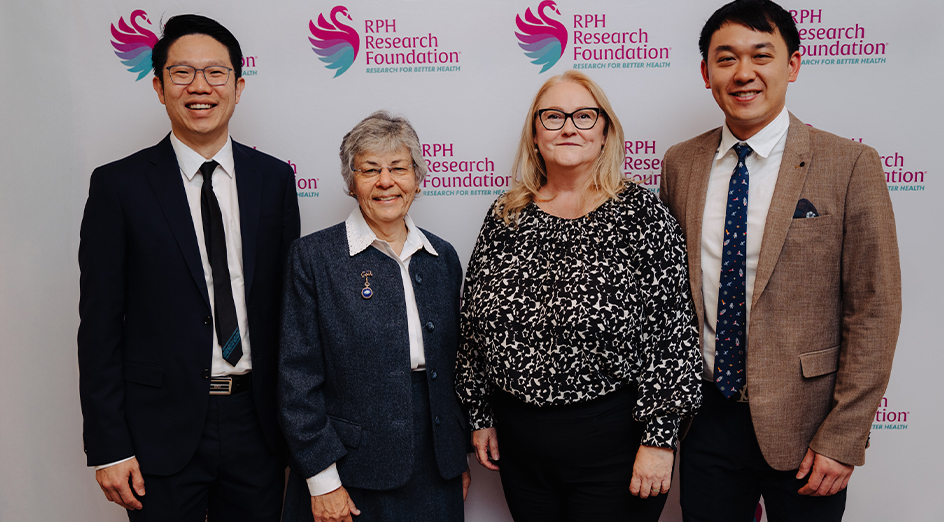Researchers from The University of Western Australia and Royal Perth Hospital will use a $1.1 million grant from the RPH Research Foundation to advance the early detection and prevention of the blood cancer leukaemia.
Led by Dr Hun Chuah, a consultant haematologist at RPH and recent UWA PhD graduate, the project brings together Chief Investigators Professor Wendy Erber, RPH Dr and Clinical Professor Michael Leahy, Associate Professor Kathy Fuller, Dr Henry Hui and Associate Investigator at RPH Dr Belinda Guo.
 Image: Dr Hun Chuah, Professor Wendy Erber, Associate Professor Kathy Fuller and Dr Henry Hui.
Image: Dr Hun Chuah, Professor Wendy Erber, Associate Professor Kathy Fuller and Dr Henry Hui.
Professor Erber said the team’s goal of transforming how leukemia was identified and subsequently managed, would focus efforts on detecting genetic changes in patients with another bone marrow condition that might become leukaemic.
“In this way, patients will be identified before they become symptomatic with leukaemia that often fails to respond with current treatments,” Professor Erber said.
“By detecting the leukaemia earlier, we ultimately aim to improve patient outcomes and reduce the burden of this aggressive blood cancer.”
She said with the incidence of blood cancers increasing, by 2035 it would be the most common and fatal cancer type.
“Currently there is no way to prevent leukaemia, in part due to the deficiencies and limitations of current testing,” Professor Erber said.
“More than 50,000 Australians are living with a chronic bone marrow disorder and are at risk of developing secondary leukaemia and patients often remain unaware of their condition until it has progressed to an advanced stage, leading to poor outcomes even with treatment.
“Our project seeks to bridge the gap in early detection strategies by identifying genetic changes before the onset of overt leukaemia, allowing timely intervention and improving patient outcomes.”
The research will utilise innovative technology known as ‘immuno-flowFISH’, a highly sensitive flow cytometry genetic test developed by the project team which can analyse thousands of cells and detect specific genetic abnormalities, even in very low frequencies (1 in 100,000 cells).
“The test’s capability holds significant promise for early detection in individuals with pre-existing blood disorders, such as multiple myeloma and myeloproliferative disorders,” Dr Chuah said.
“Our project will involve the evaluation of blood samples from 100 patients, collected over three separate occasions. By monitoring for new genetic alterations and changes in the number of affected cells, we hope to identify the critical moment when the ‘leukaemia switch’ is activated.
“If we can catch these changes early, we can implement interventions that may halt the progression to full-blown leukaemia.”
Dr Chuah said developing a pathway to prevent leukaemia could have far-reaching implications, including improving patient outcomes, advancing diagnostic testing, deepening the current understanding of leukaemia biology, and reducing preventable deaths from blood cancers.
The $1,147,284 grant was announced today at a Royal Perth Hospital Research Foundation awards.
Image above: Professor Wendy Erber and Dr Kathy Fuller with the Immuno-flowFISH in 2018.
Media references
Annelies Gartner (UWA PR & Media Adviser) 08 6488 6876
Brianna Dugan (Royal Perth Hospital Media) 0401 737 644
